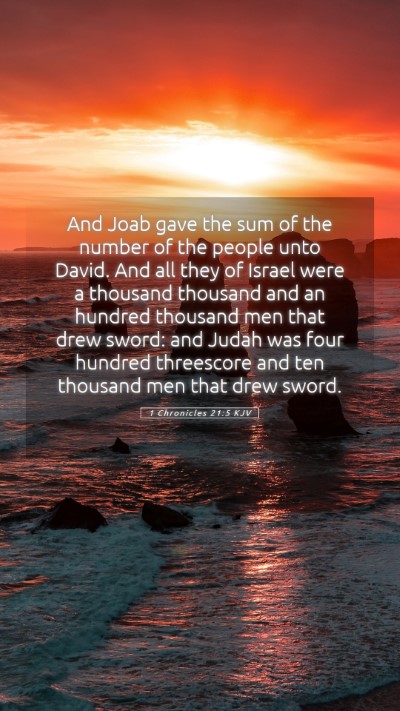Bible Verse Commentary on 1 Chronicles 21:5
Verse: "And Joab gave up the sum of the number of the people to David. And all they of Israel were a thousand thousand and a hundred thousand men that drew sword: and Judah was four hundred threescore and ten thousand men that drew sword." (1 Chronicles 21:5)
Overview and Context
This verse details the results of David's census, a significant action that weighed heavily on Israel's history. To understand this passage fully, we must explore it within its historical context, David’s motivations, and the theological implications surrounding this decision.
Historical Context
In the ancient Near East, census-taking often served military purposes, allowing kings to assess available resources and manpower. In 1 Chronicles, the chronicler recounts this moment to reflect on God’s sovereignty and Israel’s reliance on divine guidance rather than mere numbers.
Theological Implications
The act of counting the people is interpreted by many scholars as David's shift away from trust in God towards reliance on military strength and numerical representation. This transition highlights themes prevalent throughout Scripture: the tension between faith and reliance on human resources.
Commentary Insights
Matthew Henry’s Commentary
Henry discusses the census as a misstep stemming from pride and a desire for power. He emphasizes the importance of trusting in God's promises rather than human capacities. Henry encourages readers to reflect on their deviations from faith in God.
Albert Barnes’ Commentary
Barnes points out the numerical significance in this verse, indicating that there were 1,100,000 fighting men in Israel and 470,000 in Judah. He highlights the distinction made between Israel and Judah, noting that this division serves as a precursor to future conflicts and divides within the kingdom.
Adam Clarke’s Commentary
Clarke focuses on the potential motivations behind David's census. He argues that it may have stemmed from a desire to demonstrate royal power, which ultimately displeased God. Clarke's analysis underscores the broader principle of fidelity to God over humanistic approaches to governance.
Applications for Today
Understanding this Scripture fosters a sense of caution about relying solely on our own understanding, strength, or resources. This passage invites readers to contemplate their trust in divine providence and acknowledgment of God's leadership in their lives.
Insights for Bible Study Groups
- Discussion Topic: The effects of pride and self-reliance in spiritual life.
- Study Tool: Comparing this census with other pivotal moments in Israel’s history.
- Application Lesson: Trusting God’s guidance in personal and communal decision-making.
Cross References
- 2 Samuel 24:9 - Another account of the census.
- Exodus 30:12 - The principles for conducting a census.
- 1 Chronicles 27:23-24 - A further elaboration on counting the people.
Conclusion
The importance of 1 Chronicles 21:5 lies not just in the numbers, but in the underlying message about God's expectations for His people. As we delve into other Bible study insights, may we learn to rely more profoundly on divine wisdom and direction rather than mere human assessment. This passage serves as a reminder to seek God first in every endeavor while engaging actively with Scripture for deeper understanding.


